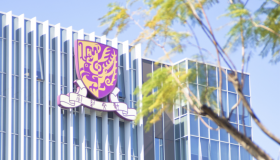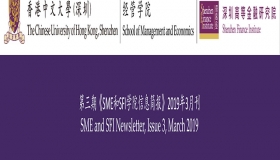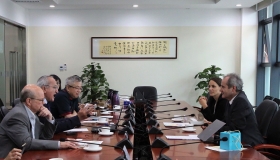Kenneth Young's Speech on the First Graduation Ceremony
Prof Sung and members of the Governing Board; President Xu and members of the staff; most importantly, graduates of CUHKSZ, your families and those whom your hold dear; distinguished guests, ladies and gentlemen:
I am much honoured to have been asked to address the graduating students, the first cohort from CUHKSZ to gain degrees from CUHK. I am delighted to join this ceremony, to share your joy and the joy of the University.
It is a milestone for you, in obtaining a Master’s degree. May I start by offering my felicitations on your achievements, and best wishes to you going forward.
I have been asked to say a few words on this occasion, and I should like to remark on three related, indeed concatenated elements of your journey:
How it came to be
How did it come to be that you joined these programmes as founding students of the Graduate School? That is inseparable from how these programmes, and how this University, came into being.
Today is not only a milestone for you, but a milestone for the University. Insofar as educating students is one of the key missions of the institution — and I would even say the key mission if a university is to be set apart from research institutes — then the first graduation ceremony must be, without question, one of the most significant events in the history of this young University.
Personally, I am much gratified to see that the University has come this far, and to have come this far so expeditiously. It was, as I recall, not so long ago when some of us were sketching out the vision and the plans for this new University. We were looking to a rapid start, because we had an academic system and a tradition to rely on and to build upon, and because we had the unstinting support and help of many key parties, not least our partner Shenzhen University and very importantly the Shenzhen Municipal Government in allowing the University to be developed on this pleasant site. And now I come to a point that is directly relevant to you, the first graduates of Master’s degree programmes: We were able to win the confidence of the Ministry of Education, so much so that approval was granted to launch postgraduate programmes from the very beginning. It was that policy, extremely unusual if not unheard of, that allowed the first postgraduate programmes to be offered from as early as 2015, only one year after the University was launched. And here you are.
What you have learnt
You have completed subjects that are technical and professional, and you have learnt much that is useful, relevant, up-to-date and at high levels, and as the Graduate School documents say (and here I quote) ‘comprehensive, state-of-the-art knowledge and relevant expert skills in the subject discipline’ that would put you on the path towards leadership positions in your disciplines. All that goes without saying, and that is no doubt what would be topmost in people’s minds — your level of attainment in the respective subjects, be it translation or finance. But I hope you have learnt more, much more.
After all, in this age of knowledge explosion, what knowledge anyone can acquire in a year or two is minuscule compared to the vast universe of what there is to know. The first thing that any university student, especially graduate student, would have picked up is the ability and indeed the proclivity to learn, lifelong. The specifics of what you toiled through would fade as the years go by, and it is said that ‘Education is what remains after one has forgotten what one has learned in school’— a saying that has been attributed to many people, including Einstein.
What does remain, what should remain, ought to include — and I quote from the expected attributes of CUHK graduates that have been officially adopted: ‘an appreciation of the values of a broad range of intellectual disciplines … and above all the ability to continue with life-long learning and professional development … They [that is, the graduates] should have cultivated a habit of reading widely, learnt to be critical and independent; … Our students are also expected to have a deep understanding of Chinese culture and with it a sense of national identity and pride; … a high degree of inter-cultural sensitivity and a global perspective. They should have an attitude of compassion, honesty and integrity in relation to self, family and society, and the ability to contribute as citizens and leaders. They should have a sense of purpose, responsibility and commitment in life, a desire to serve, as well as taste in their pursuits.’ Not subjects listed in your course syllabi, not skills that are specially taught, much less examined; but I hope these are values that permeate the air on these gentle hills, and that you have imbibed in your sojourn on this campus.
I shall come back in a moment to national identity and pride, and to contributing to self, family, society, and the world. But before I do that, I want to draw attention to one other attribute that you would have gained. I hope you have learnt to appreciate truth and beauty, and to have gained a love for the pursuit of truth and beauty for their own sakes, and not just for the practical purpose of a piece of translation or a financial instrument. Plato, in his famous discourse on the nature of love, said, through the mouths of Socrates and the priestess Diotima, that true love transcends beautiful bodies, beautiful laws and institutions, even beautiful souls, but attains its highest form in the beauty of knowledge and in the very idea, the platonic idea, of beauty itself. Because that, in the last analysis, is what a university is about: A university is about ideas that express beauty, that capture the human intellect, that elevate the human spirit, and that, in the last analysis, distinguish us from lower beings which happily eat, sleep and procreate. A university is a place where these ideas encapsulating truth and beauty are created, celebrated, and passed along, and it is perhaps not too much to hope that this fever for the beauty of knowledge and the idea of beauty and truth, would have infected you.
What you will do
Armed with your freshly minted degrees, you will go forth into the world, to rewarding careers. You have already embarked on that path. I wish you well on that journey, and I am sure you will go far.
But to what end should you purpose your life’s journey? The motto of CUHK is ‘To combine tradition with modernity; to bring together China and the West’. It is therefore not inappropriate, on this occasion, to make reference to ancient Chinese educational philosophy. From Confucian times, education aimed to groom the learned gentleman, and was to be pursued for its own sake. But at the same time, the scholar-gentleman was supposed to put his learning to use, not of course in the modern economic sense, but in the classical sense of contributing to society, to the country, to the world at large. The passage from Daxue (Great Learning) must be well known to all of you, about the true purpose of scholarship, indeed of life, ultimately being to ‘regulate the family, to rule the kingdom and to bring tranquillity to all under heaven’ 齊家治國平天下. That is a call to have regard for the wider communities of which we are a part, and which, in many ways, give larger meaning to our lives. It is perhaps no longer right in the twenty-first century to talk about ‘regulate’ and ‘rule’; with a healthy dose of humility it is much better to emphasize how to contribute and to serve, a sentiment that is echoed by the Christian Bible: ‘For even the Son of man came not to be ministered unto, but to minister’.
Therefore I seek your indulgence in gently rephrasing the sayings of the sage, and to exhort you to ‘Raise your families, contribute to the national dream, and work for the benefit of all under heaven’ 旺家興國澤天下 . It is the larger purpose that enriches the meaning of life; it is the larger purpose that should distinguish graduates of this University.





